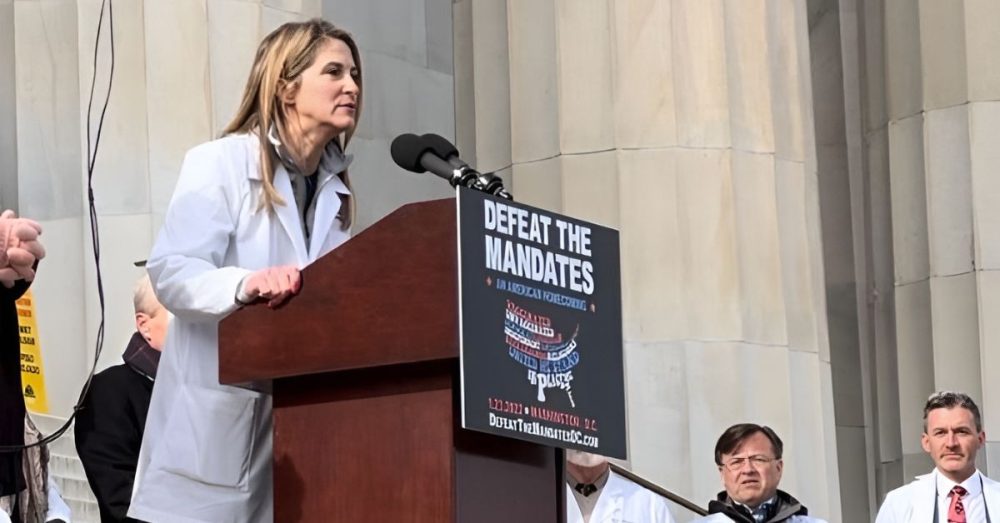Houston ENT and COVID Crusader Dr. Mary Talley Bowden has been kicked off another social media platform.
The professional networking platform LinkedIn gave Bowden the ax.
“I think @LinkedIn kicked me off for good. I promised to behave, but they locked me out of my account anyway,” she posted to X on October 28.
Along with her tweet, she posted screenshots of a message she had received on October 23 from a LinkedIn Member Safety and Recovery Consultant. The correspondence thanked the doctor for agreeing with the platform’s user agreement after some implied previous incident and let her know that her account would be restored to normal over the next several days.
I think @LinkedIn kicked me off for good.
I promised to behave, but they locked me out of my account anyway. pic.twitter.com/xjqFqltcQB
— Mary Talley Bowden MD (@MdBreathe) October 28, 2024
One X user asked, “No explanation of the supposed offense?”
“None,” Bowden responded.
LinkedIn is aware of Bowden’s situation because the platform’s help desk responded to other users in the comments section but not the doctor’s original post. When another physician complained of being locked out of her account for years, the official LinkedIn Help account responded, “Oh no, I am so sorry to hear this! I’d be happy to help look into this, but first please send me a DM with the email linked to your account. Looking forward to hearing back from you. -TK.”
Oh no, I am so sorry to hear this! I'd be happy to help look into this, but first please send me a DM with the email linked to your account. Looking forward to hearing back from you. -TK
— LinkedIn Help (@LinkedInHelp) October 28, 2024
“Lol,” Bowden responded.
LinkedIn has not published a statement about Bowden’s removal from the platform or otherwise responded to her. Links to her LinkedIn page are met with an error message that reads “Something went wrong.”
Bowden’s ban raises the implicit concern that this could be another instance of social media censorship against COVID dissidents, like those actions taken by Facebook at the behest of federal agencies that CEO Mark Zuckerberg recently confessed to.
This is hardly the doctor’s first experience with a social media ban. Bowden has been banned from TikTok multiple times, The Dallas Express previously reported. Her content on the platform was entirely clips of previously aired interviews she had done discussing COVID-era policies and medicine.
Although X, formerly Twitter, now has a better reputation for allowing a greater spectrum of speakers to use the platform, there are still censorship concerns that involve both COVID and Bowden.
When Project Veritas, a private investigative organization, published an undercover video of a top DOJ lawyer admitting the FDA was wrong for condemning Ivermectin on social media, Veritas intentionally misspelled the antiparasitic drug Ivermectin as “Ivermect*n,” DX previously reported.
This was a technique used by dissidents during the pandemic era to throw off censors. Words such as Ivermectin which were likely to draw the attention of social media censors would be spelled with asterisks or exclamation points replacing letters. Words like “jabbed” would be spelled as “jibberjabbed” or “vaccinated” as “Vaxxxxxxed.”
The continued misspelling in this context indicated Veritas was suspicious new content could still be censored.
Bowden had been the plaintiff in the case against the FDA. After years of wrangling and with the legal winds at her back after the federal appellate court sided with her on key procedural grounds, the FDA settled the case, agreeing to remove its social media posts.
Nevertheless, Bowden’s legal battles have continued. Even after defeating some complaints against her at the Texas Medical Board, Bowden still faces major obstacles related to her efforts to treat an ailing COVID-infected Sheriff’s Deputy, Jason Jones, during the pandemic. There are many elements to the case; however, the most consequential is whether Bowden had the right to attempt to treat the deputy while he was in the care of Texas Health Huguley Hospital in Fort Worth.
Bowden had found Ivermectin to be effective when used early in the several thousand COVID cases she treated.
Jones had suffered a variety of serious medical ailments after coming down with the virus. His health declined precipitously and Huguley obstructed Bowden’s several attempts to treat the patient. This caused a permanent delay in his interactions with Bowden.
The deputy never fully recovered and subsequently died several months after leaving the hospital.
The case against Bowden has endured despite numerous demands from elected officials for it to end and an investigation from The Dallas Express that uncovered texts from members of the medical board that appeared to indicate that some of the people who presided over her case harbored negative sentiments about the doctor.


